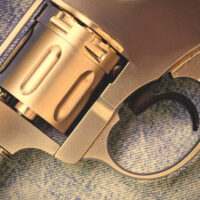State Must Establish that Defendant Knew a Firearm Was Defaced

A lawsuit filed against an Illinois resident alleged that the defendant was in possession of a firearm in which the serial number had been filed off. The defendant appealed the conviction on the basis that he had no idea that the firearm’s serial number had been filed off and that the prosecution never established that he knew that the firearm had been defaced. This is a crime of knowledge, similar to fraud, in which, to commit a fraud, the prosecution must establish that you intended to deceive. In this case, the prosecution never established the defendant’s intent and thus the case was remanded back to the trial court to be retried.
Possession of a defaced firearm
720 ILCS 5/24-5 establishes that:
(a) Any person who shall knowingly or intentionally change, alter, remove or obliterate the name of the importer’s or manufacturer’s serial number of any firearm commits a Class 2 felony.
(b) A person who possesses any firearm upon which any such importer’s or manufacturer’s serial number has been changed, altered, removed or obliterated commits a Class 3 felony.
(c) Nothing in this Section shall prevent a person from making repairs, replacement of parts, or other changes to a firearm if those repairs, replacement of parts, or changes cause the removal of the name of the maker, model, or other marks of identification other than the serial number on the firearm’s frame or receiver.
In this case, the law is not clear on the matter, but the appeals court upheld that in order to convict a defendant on the grounds of possessing a defaced firearm, they must also establish that the defendant knew the firearm was defaced. Three guns were recovered from the apartment in which the defendant lived and only one of those guns, a shotgun, had the serial number scratched off. The state proceeded to trial on a single count related to 720 ILCS 5 24-5 (b) which stipulates that anyone in possession of a defaced weapon is guilty of a class-3 felony.
In this case, the state failed to present any evidence related to whether or not the defendant knew that the shotgun had been defaced—only that the shotgun was found within his residence. This was the only charge he faced for any of the weapons.
The trial court believed that the defendant did not need to know that the firearm had been defaced, only that the defendant was in possession of the weapon. In this case, the defense agreed that the defendant did possess the weapon. However, since the prosecution entered no evidence to establish what the defendant knew, the case was overturned on appeal.
Talk to an Illinois Criminal Defense Lawyer Today
Patel Law, PC represents the rights of those accused of weapons violations in Illinois. Call our Decatur criminal lawyers today to schedule an appointment, and we can begin discussing your options immediately.
Source:
ilcourtsaudio.blob.core.windows.net/antilles-resources/resources/b6da6753-8452-4254-b0ef-d6df75f4d623/People%20v.%20%20Ramirez,%202023%20IL%20128123.pdf
